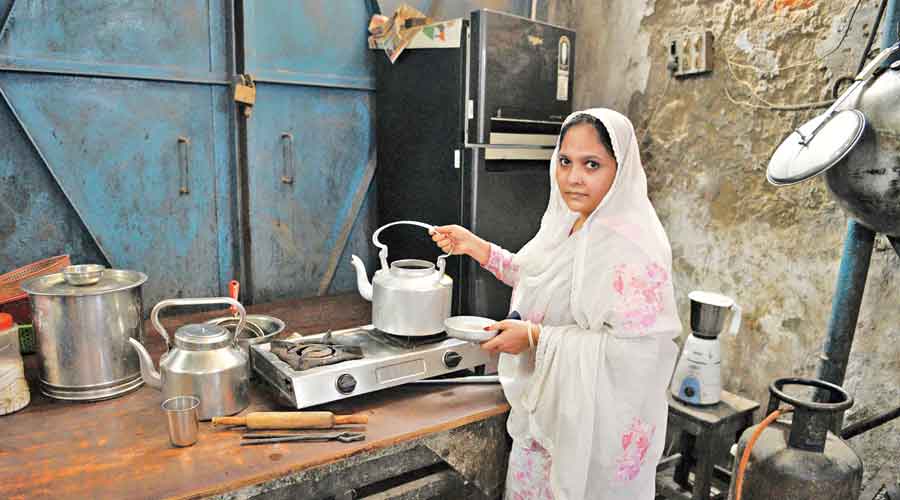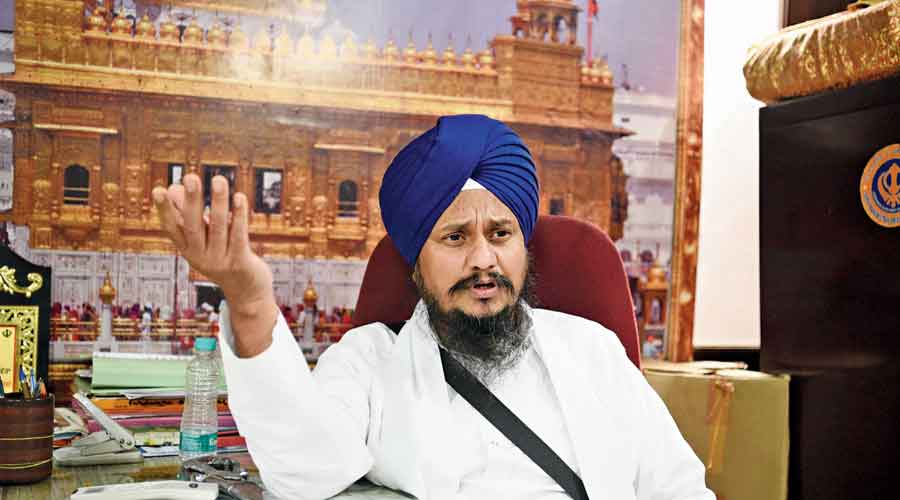The attempt to demonise one community to secure the votes of another is dirty politics, the head of the highest temporal body of Sikhs said in Calcutta on Sunday.
Giani Harpreet Singh, the jathedar of Akal Takht Sahib, Amritsar, also said Bengal elections would decide the future course of India’s politics.
“The hate-filled campaign against one particular community to polarise the votes of another community is dirty politics, something that should be avoided…. It is a loss for the country and humanity,” Singh told The Telegraph on the sidelines of a Gurmat Samagam (religious gathering) at Gurdwara Behala.
Without naming any political party, Singh said the Bengal elections would decide the future politics of India. “In the land I come from, all eyes are on Bengal. The election of Bengal will decide the political future of India. It will decide if federalism crumbles or continues to thrive in India,” he said.
Attempts to polarise voters on religious lines have been one of the defining traits of the state polls. One leader after another from the BJP has accused the Mamata Banerjee government of “blatant minority appeasement”.
The campaign speeches of Prime Minister Narendra Modi and Union home minister Amit Shah have drawn charges that the desperation to win the elections has made them fall back on a polarisation tactic unbecoming of their offices.
Last week, the Election Commission of India had barred Mamata Banerjee from campaigning for 24 hours for her remarks against central forces and a statement which had alleged religious overtones. The poll panel has so far been mum on Modi and Shah.
“Communal polarisation for political dividends was not new in India. But it has found new traction over the past seven-eight years. But the problem is not limited to India. All over the world, there is a rise in the politics of hate and polarisation,” Singh said on Saturday.
Before Independence, Bengal and Punjab had been the prime targets of the British, Singh said, because “these two places tormented the colonial rulers the most”.
“That is why they wanted Partition, that would most affect Bengal and Punjab. Even today, these two states are symbols of resistance against the powers that be,” he added.
He slammed the “branding of dissenters as anti-nationals”.
“The government is not the country. Criticising the government does not mean taking a stand against the country. The government calls someone Pakistani, calls someone else Khalistani. This is absolutely wrong. Dissent is needed for the health of a democracy. The State should engage with people opposed to it,” he said.
“In the same vein, the Narendra Modi-regime should engage with the farmers protesting at Delhi’s borders for so many months. After the Republic Day flare-up, the government has simply stopped talking to farmers. The channel of communication should be opened again,” Singh told this newspaper..
Singh is in Calcutta to take part in a series of events to celebrate the 400th birth anniversary of Guru Tegh Bahadur, the ninth of the 10 gurus of Sikhism. At an interfaith congregation at ICCR on Saturday, Singh had spoken at length on the need to preserve religious harmony.
On Sunday, Gurdwara Behala was a glowing example of that harmony. People from different faiths had turned up for the langar that followed the Gurmat Samagam.

Shilpi Pal prepares tea at Gurdwara Behala on Sunday Telegraph picture
“Sikh soldiers of a British cantonment settled in this area (now New Alipore-Taratala) built a small gurdwara for prayers. Today, it is a meeting place for Sikhs, Punjabis, Sindhis, Hindus and everyone else,” said Satnam Singh Ahluwalia, the general-secretary of Gurdwara Behala.
Shilpi Pal, a resident of the area , has been visiting the gurdwara for 15 years. A mother of two, Pal lost her husband in June last year. She works in a tailoring unit to sustain her family. Pal visits the gurdwara every day and helps in preparing food for “around 30-40 people”.
“Man ko sukoon milta hai (I get peace of mind),” she said.
Sikh community leaders from Delhi and Ludhiana and priests of gurdwaras from across the state turned up for the programme at Gurdwara Behala on Sunday.
“The government is not the country. Criticising the government does not mean taking a stand against the country. The government calls someone Pakistani, calls someone else Khalistani. This is absolutely wrong. Dissent is needed for the health of a democracy. The State should engage with people opposed to it,” he said.
“In the same vein, the Narendra Modi-regime should engage with the farmers protesting at Delhi’s borders for so many months. After the Republic Day flare-up, the government has simply stopped talking to farmers. The channel of communication should be opened again,” Singh told this newspaper.
Singh is in Calcutta to take part in a series of events to celebrate the 400th birth anniversary of Guru Tegh Bahadur, the ninth of the 10 gurus of Sikhism. At an interfaith congregation at ICCR on Saturday, Singh had spoken at length on the need to preserve religious harmony.
On Sunday, Gurdwara Behala was a glowing example of that harmony. People from different faiths had turned up for the langar that followed the Gurmat Samagam.
“Sikh soldiers of a British cantonment settled in this area (now New Alipore-Taratala) built a small gurdwara for prayers. Today, it is a meeting place for Sikhs, Punjabis, Sindhis, Hindus and everyone else,” said Satnam Singh Ahluwalia, the general-secretary of Gurdwara Behala.
Shilpi Pal, a resident of the area , has been visiting the gurdwara for 15 years. A mother of two, Pal lost her husband in June last year. She works in a tailoring unit to sustain her family. Pal visits the gurdwara every day and helps in preparing food for “around 30-40 people”.
“Man ko sukoon milta hai (I get peace of mind),” she said.
Sikh community leaders from Delhi and Ludhiana and priests of gurdwaras from across the state turned up for the programme at Gurdwara Behala on Sunday.

